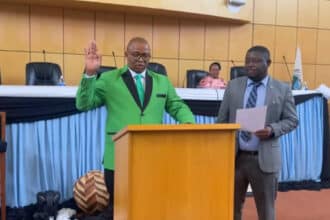-
Feeling ‘neglected’ Pensioners call for more recognition from govt
Old age pensioners have got a youthful spring in their steps as they set about lobbying government and the private sector for improved representation in the country’s different institutions.
With 28 branches across the nation and over 4, 000 members, Botswana Civil Service Pensioners Association (BCSPA) are demanding better recognition for pensioners and the elderly.
Crying out loud, BCSPA President, Baikatlhodi Kesenye accused government of neglecting them and essentially treating the oldies like second-class citizens.
“As pensioners and elderly, the government has forgotten us; we do not have a ministry that identifies with us. This means no-one talks on our issues directly, yet others are privileged to have a youth and gender department, but we hear less about representation for the elderly,” he grieved.
Speaking at the Association’s 14th Annual General Meeting, held under the banner: ‘Digital Equity for All Ages’, in Gaborone on Wednesday, Kesenye revealed the Association is on a mission to help the country’s elderly become more digitally savvy.
He further bemoaned that while salary increments were being considered for the working class, there were no incentives on the table for pensioners, even though they are struggling with the same crippling levels of inflation as everyone else.
“We go into the same shops, as those working and inflation touches us all,” said Kesenye, emphatically lobbying for a department to look into the welfare of pensioners.
He urged the financial institutions to consider start-up loan applications from pensioners, as they are not prone to being defaulters.
“Pensioners have the potential to create employment if financial institutions can recognise us as potential customers,” insisted Kesenye.
Meanwhile, the Minister of Communications, Knowledge and Technology, Thulagano Segokgo conceded there is great need to help the elder generation access and understand the digital world better. He maintained that once they become active participants, it will ultimately enrich their lives.
“We have noted that the digital revolution has evolved faster than the acquisition of skills for most elderly people. Even to some who may believe they have some knowledge, most of them are not able to fully utilise their digital equipment such as cellphones, computers or laptops and tablets,” said Segokgo.
The Minister admitted the provision of internet services is not equally distributed, even where it is readily available, such as in cities and big villages.
“It is not everybody who can afford the fees for both installation and maintenance,” said Segokgo, adding government is committed to ensuring digital equity by increasing the geographical and population coverage of mobile signals, expanding the footprint of fixed services to reach all destinations.
“We will also strive to look at other policy measures we can adopt to reduce the input costs for operators and in turn reduce tariffs,” he added.
He revealed his ministry will pursue a strategy of educating elders through radio and television, with particular focus on the opportunities of ICT and how to use it effectively.







